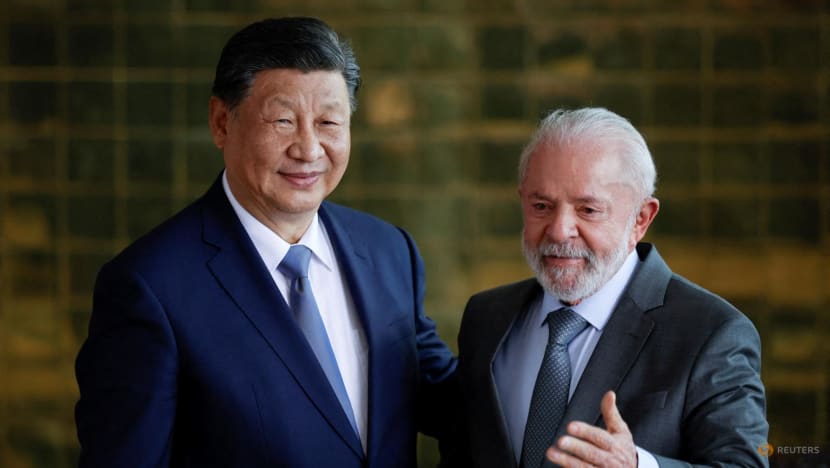China, Brazil agree to defend free trade as leaders meet in Beijing

China's President Xi Jinping and Brazil's President Luiz Inacio Lula da Silva meet in Brasilia, Brazil on Nov 20, 2024. (File photo: REUTERS/Adriano Machado)
BEIJING: China and Brazil pledged on Tuesday (May 13) to defend free trade and multilateralism, signing a string of agreements in Beijing to strengthen their ties amid global uncertainty triggered by United States President Donald Trump's import tariffs.
The two countries should firmly oppose unilateralism, protectionism and "acts of bullying", Chinese President Xi Jinping told Brazilian President Luiz Inacio Lula da Silva, the official Xinhua news agency reported.
Lula said the two countries' relations had "never been more necessary".
"China and Brazil are determined to unite their voices against unilateralism and protectionism," the Brazilian leftist leader said, according to Brazilian state television.
Lula is in Beijing on a four-day official state visit during which he is attending a high-profile forum in Beijing along with other Latin American and Caribbean officials, including Chile's President Gabriel Boric and Colombia's President Gustavo Petro.
Xi and Lula watched on Tuesday as 20 agreements were signed, including highly anticipated deals for more Brazilian agricultural exports to China.
Currency swap, mining and sustainable nuclear energy deals were also reached. In a joint statement on the Ukraine crisis released on the same day, the two sides said direct dialogue was the only way to end the conflict between Russia and Ukraine and that they hoped it would begin as soon as possible.
The meeting on Tuesday was Lula's third with Xi since the Brazilian leader returned to power in 2023, underscoring warming relations between Latin America's largest economy and China, which is Brazil's largest trading partner.
Washington and Beijing over the weekend reached a deal to temporarily slash tariffs after talks between Chinese and US officials in Geneva.
Lula, a critic of Trump's trade policies, has sought to boost the South American commodity giant's exports to China, its largest export market, and to attract Chinese investment.
TRADE AND INVESTMENTS
In another joint statement released on Tuesday, the two countries said they recognise the importance of continuing to develop bilateral economic and trade relations, and vowed to strengthen cooperation in agriculture, science and innovation.
Ahead of Lula's visit, Beijing lifted restrictions for Brazilian soybean shipments from five firms previously suspended over phytosanitary concerns as China sought to pivot away from US imports.
China, which purchases more than 60 per cent of globally traded soybeans, sources over 70 per cent of its imports from Brazil.
At a business forum attended by Lula in Beijing on Monday, Brazil's trade and investment promotion agency said it helped attract around 27 billion reais (US$4.8 billion) of Chinese investment to Brazil.
Chinese automaker Great Wall Motor, delivery giant Meituan, and Chinese energy, metal and beverage companies, including CGN Power, Envision, Mixue and Baiyin Nonferrous Group, announced investments in Brazil worth between two billion and six billion reais.
The deals covered a broad range of categories, including sustainable aviation fuel, electric vehicles, semiconductors, insulin and coffee beans.
In Brasilia last November, Xi and Lula upgraded the status of their diplomatic relations and struck more than three dozen agreements to cooperate on infrastructure, energy, agribusiness and other strategic sectors.
They will meet again in Rio de Janeiro at the BRICS summit in July, with Xi's attendance confirmed.
Xi is also expected to visit Brazil for the United Nations climate summit in November, which officials expect to include some 1,000 Chinese business leaders.
















